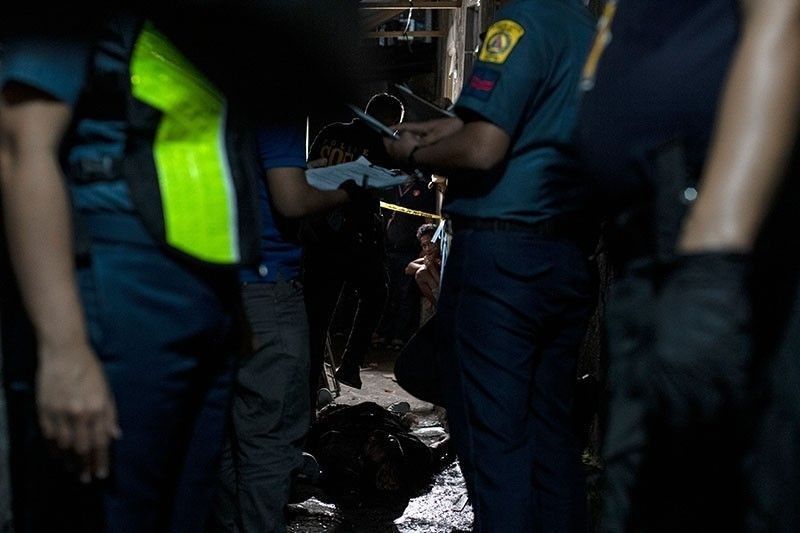After DOJ review, 250 more 'war on drugs' cases sent to NBI

MANILA, Philippines — Months before President Rodrigo Duterte steps down from office, the National Bureau of Investigation will conduct case build-up on “war on drugs” operations that resulted in deaths from July 2016 to June 2020, Justice Secretary Menardo Guevarra said.
In his speech before the United Nations Human Rights Council, Guevarra said the Department of Justice-led "war on drugs" review panel is set to endorse 250 cases that involve reported deaths in Central Luzon anti-narcotics operations.
Justice Undersecretary Emmeline Aglipay-Villar told reporters that the 250 cases referred to the NBI, an attached agency of the department, is for "case build-up and determination of possible criminal liability."
Case build-up could lead to criminal complaints being filed. Those complaints will then go through preliminary investigation that could lead to an indictment, which might then lead to trial.
The case files cover the period of July 1, 2016 to June 30, 2020 involving anti-illegal drug operations where deaths occurred, she added.
Review began in 2020
The DOJ-led “war on drugs” review started in 2020, when Guevarra told the UNHRC that the panel was formed to conduct “a judicious review of the 5,655 anti-illegal drug operations where deaths occurred.”
Two reports have since been drafted by the panel. The first covered 300 cases in few provinces such as Bulacan and Pampanga, but this was not publicized and was submitted directly to President Rodrigo Duterte.
A matrix was released on the second report that covered 52 cases from the police’s Internal Affairs Services where it found direct liability on cops involved in the deadly “war on drugs” operations.
Guevarra told the UNHRC that four of the 52 cases, which were also referred to the NBI, have reached the courts, while the bureau is preparing to file five more complaints against erring law enforcement operatives.
Rights groups however criticized the DOJ-led review saying it came "too late," and that investigation must go beyond police officers who have killed and look into how they were emboldened to do so.
RELATED: Callamard: DOJ-led review of 'drug war' deaths must go 'beyond who pulled the trigger'
AO 35 mechanism
In the same speech, Guevarra also said the review panel’s work has been complemented by investigations under the Administrative Order 35 mechanism that looks into politically-motivated killings.
"In the past year alone, this inter-agency committed created 15 Special Investigation Teams that looked into extra-legal killings and other incidents involving gross violations of human rights and of humanitarian law," he said.
The SITs investigated the Bloody Sunday raids where nine activists were killed in separate operations to serve search warrants in Calabarzon provinces.
Guevarra said the investigation into the said raids has been recently completed and the committee "will shortly initiate the process to prosecute a number of law enforcement officers."
Complaints have so far been filed over the deaths of Manny Asuncion and couple Chay and Ariel Evangelista.
Two rapporteurs invited
Guevarra also said the Philippine government has invited two special rapporteurs to the country.
"We look forward to working with the Special Rapporteur on the Sale of Children [Mama Fatima Singhateh from Gambia] late this year, and the Special Rapporteur on Freedom of Expression [Irene Khan from Bangladesh] in 2023," the DOJ chief added.
But, years ago, the Philippines cancelled the visit of then-UN Special Rapporteur on extrajudicial killings Agnes Callamard, who was set to investigate the killings of drug suspects in the Duterte administration.
Duterte instead said he wanted to have a public debate with Callamard rather than a private meeting.
RELATED: UN rapporteur rejects Duterte's conditions on EJK probe
Guevarra said he cannot speculate why the government then "was not agreeable to a visit" by Callamard, "one thing sure, though, is that at present we have a formal legal framework, the Philippine-UN joint program on technical cooperation for the protection and promotion of human rights."
Guevarra said that under the joint program, “such visits of special rapporteurs could be carefully planned and implemented without any pre-existing bias.”
The Philippines and the UN inked a three-year joint program for capacity-building on human rights in July 2021.
While noted as a “milestone” program, Human Rights Watch Asia Division Senior Researcher Carlos Conde said then that it will just be a "spin that flies in the face of the bloody rights catastrophe that is the government’s war on drugs."
Conde noted that even if the program is successful, "the UN’s support will not address the core problem: the program has no prospect of convincing Duterte to reverse course and hold abusive officials to account."
"After all, the killings continue and accountability is practically zero," he added.
- Latest
- Trending



























